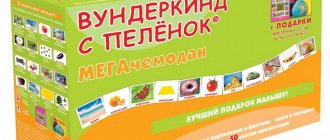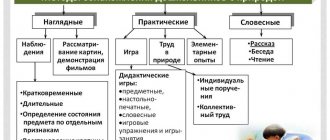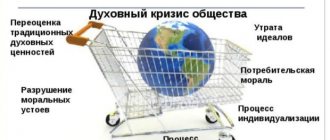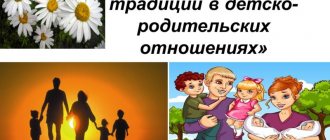Project topic: Family values in the moral education of preschool children"
The moral health of our society depends on how moral and kind our children are. What a child receives in the family, he retains throughout his life.
Objective of the project:
Increasing the role of family values in the development of a child’s personality and his moral education.
Project objectives:
- Create conditions for effective interaction between kindergarten and family to familiarize preschoolers with the world of moral values of family traditions.
- Provide parents with theoretical knowledge and practical skills
positive interaction with children in various activities.
- Arouse interest among children and parents in the family and its history.
- Show children the importance of family in every person’s life. To instill in children love and respect for their parental home, family, their loved ones, and the older generation.
Project participants:
Parents, preschool teachers, children, social institutions
Project implementation:
2009 - 2011
Project Features
- relying on the personal experience of children gained in the family
- accessibility of material for preschool children
- Maximum involvement of parents and provision of practical assistance to them in familiarizing children with family values and family history
- integration of joint activities of children and parents at home with their activities in a preschool educational institution
Problems that the project aims to solve
- The collapse of the continuity of generations, the disappearance of family traditions.
- The extremely low level of moral culture of the majority of modern parents as insufficient competence of the family in matters of moral formation and education of the child’s personality.
- Loss of the family function of transmitting significant cultural and life values to children.
- Preschoolers lack knowledge about their family and its history.
- Distorted ideas about the meaning of human life and true values among the younger generation raising adults.
- Disconnection between family and kindergarten.
The family is the first social institution that a child encounters in life and is a part of. Family is central to
raising a child, plays a major role in the formation of the worldview, moral standards of behavior, feelings, social and moral appearance and position of the child. In a family, raising children should be based on love, experience, traditions, and personal example from the childhood of relatives and friends. And no matter what aspect of a child’s development we consider, it will always turn out that the family plays the main role in the formation of his personality at different age stages.
That is why the problem of preserving family values and reviving family traditions becomes relevant and is determined by the enormous role played by the family and family traditions in the development and formation of the child’s social and moral culture.
Implementation of project stages
From a young age we have been working on compiling family photo albums. Parents take an active part in their design.
The most favorite game among the children in our group is “Family”. During this process, children learn the terms of kinship and form ideas about opportunities and mutual understanding in the family. We started playing it at a young age.
Ethical conversations are of great importance for the formation of children’s ideas about moral values in the family. They are held from a young age and vary in subject matter.
At organized meetings with parents, we try to explain to them how important their personal example, joint activities, and heart-to-heart conversations are for conveying moral and moral ideas to children.
A library collected with the help of parents provides great assistance in shaping children’s ideas about family and the relationships of loved ones.
We also conduct organized excursions to the city children's library, where children participate in various activities.
The classes and conversations from the cycle “My Family”, “Genealogy - an Ancient Russian Tradition”, “Image of My Family” are valuable in their content.
The group held a series of classes on the topic “Lessons of Goodness,” where the conversation was about moral and ethical values, mercy and respect for elders.
As part of family artistic and creative projects, projects such as “You are an adult, I am a child”, “Bird of family happiness” were implemented.
The main goal of such projects is to strengthen the family, involve children and adults in the creative process; communication between parents and children.
To develop children’s interest in their ancestry, together with their parents, they created a “family tree”
One of the traditions of our kindergarten is the “Plant a Tree” campaign, in which parents take an active part.
Fostering respect for nature is an important part of
moral development of the child’s personality.
Oral folk art plays an invaluable role in the moral education of a child. Together with parents, we created a collection of proverbs and sayings about family and the education of moral qualities.
Thematic consultations, reminders, and booklets for parents have been developed.
Love for animals is a good, cheerful feeling, the basis of many important moral qualities: compassion, the desire to show care, attitude towards the weak. To this end, we held a series of conversations, classes, and organized a joint photo exhibition “Favorite Pet”; conducted a survey. Joint holidays are very popular among children and parents, which bring family members closer together and find an emotional response in the hearts of children.
In the museums of our city, children learned about the traditions and customs of our people, how they used to live in Rus', and how strong our Motherland is. We keep in touch with the school. The children visited the Museum of Military Glory there, learned about the heroes and fellow countrymen of the Great Patriotic War. Various games, exercises, and assignments help track children’s knowledge on the topic “What is a family and why is it needed.”
According to parents, preserving family values, respect for them, and reviving traditions have a beneficial effect on positive relationships in the family. Children develop a sense of responsibility, mutual care, help, respect towards their family and friends
Consequences of solving the problem
The competence of parents in matters of family education increases. The continuity of family generations is being restored. Children will receive the necessary information about their family, its history, traditions and customs.
There is an exchange of experiences of family upbringing and traditions. Search for new forms of interaction between teachers and parents.
And the main result on which our work is aimed is the child’s assimilation of eternal values: mercy, compassion, love for family and friends, in his desire for good and rejection of evil.
Family and family values. Consultation for parents in kindergarten
Family and family values in raising a preschooler
“The way childhood was spent, who led the child by the hand during childhood, what entered his mind and heart from the world around him - this decisively determines what kind of person today’s child will become.” /IN. A. Sukhomlinsky / Family is the first social institution that a child encounters in life, of which he is a part. The family takes a central place in raising a child. It is she who plays the main role in the formation of the worldview, moral standards of behavior, feelings, social and moral appearance and position of the baby. It is in the family that raising children should be based on love, experience, traditions, and personal example from the childhood of relatives and friends. And no matter what aspect of a child’s development we consider, it will always turn out that the family plays the main role in the formation of his personality at different age stages. Therefore, the main problem of preserving family values is the revival of family traditions, which the family and family traditions play in the development and formation of the social and moral culture of the child. The formation of values is a process of educational influence on a person, on the result of this educational influence. The process of forming values begins in early childhood and lasts throughout a person’s life during his socialization. Many scientists, such as: A. N. Leontiev, M. I. Lisina, N. I. Nepomnyashchaya and others, consider the senior preschool age as sensitive for the formation of values, since this is the period of formation of the child’s emotional sphere, the development of empathy , voluntary behavior, self-regulation, assimilation of moral norms and standards, rules of behavior, etc. Preschool institution and family are two social institutions on which the effectiveness of the process of raising a child depends. Of course, the influence of the family on the child is stronger than the influence of a preschool institution or school. However, the family cannot fully ensure the upbringing of an active, moral and creative personality. Therefore, cooperation between family and kindergarten is necessary. Neither a kindergarten, a school without a family, nor a family without a kindergarten, schools are capable of coping with the subtlest and most complex tasks of human development. It’s not for nothing that the old aphorism says: “The most difficult thing in working with children is working with their parents.” The main task of the teacher in organizing interaction with parents is to intensify the pedagogical and educational activities of the family, to give it a purposeful, socially significant character. It is the relationships of all participants in the educational process that contribute to the formation of personality. Purposeful communication with family is of great social importance. This interaction determines the pedagogical tactics of the preschool institution and allows the teacher to find the right words when communicating with parents. The family and kindergarten are characterized by specific capabilities in the formation of a meaningful “image of family” in a preschooler, which is the basis for differentiating the priority spheres of their influence in this process. The teacher’s task is to help preschoolers understand and develop a family’s orientation towards the world and its values. To do this, it is necessary to organize your educational work so that the teacher and parents go in the same direction. The family is a unique primary society that gives the child a feeling of psychological security, support, and unconditional, non-judgmental acceptance. This is exactly what modern specialists and scientists in the field of family talk about (T. A. Markova, O. L. Zvereva, E. P. Arnautova, V. P. Dubrova, I. V. Lapitskaya, etc.). In their opinion, a family institution is an institution of emotional relationships that a child receives from people close to him. Raising children must be built on love, experience, traditions, and personal example from childhood of relatives and friends. Therefore, the main role in the development of his personality at different age stages is played by the family. Recently, the problem of preserving family values and traditions has become the most pressing. The principle on which our whole life is based is family values. By these principles we judge what is right and what is wrong.
We recommend watching:
Consultation for parents of preschool educational institutions Games for the development of fine motor skills in preschool children Consultation for parents of kindergarten Recommendation for parents of future first-graders
Similar articles:
Child's interaction with the outside world
Family parenting styles in brief
Raising a teenager. Tips for parents
Family parenting styles and their influence on the development of a child’s personality
Family traditions in raising children



